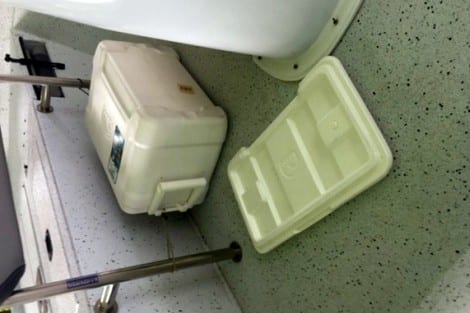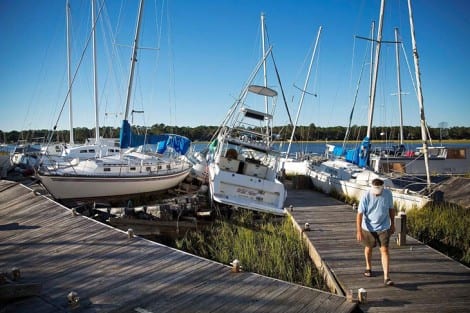 By Bob Currie, Recreational Boating Safety Specialist
By Bob Currie, Recreational Boating Safety Specialist
U. S. Coast Guard Auxiliary Station Galveston Flotilla
Hurricane Laura is over for the Texas and Louisiana Gulf Coast. We all rode the storm out in various ways. Some, like me, evacuated. I actually evacuated twice. The first place to which I evacuated turned out to be right in the storm’s path and I had to go a few hundred miles further north. Some remained home and rode the storm out. Those in the Houston area suffered very little damage, while those in Louisiana suffered catastrophic loss. Those in the Beaumont area suffered severe damage in some cases.
The Station Galveston Flotilla of the US Coast Guard Auxiliary operates out of the USCG Station Galveston base on Galveston Island. They aid the Coast Guard by providing maritime observation patrols in Galveston Bay; by providing recreational boating vessel safety checks; and by working alongside Coast Guard members in maritime accident investigation, small boat training, providing a safety zone, Aids to Navigation verification, in the galley, on the Coast Guard Drone Team and watch standing.
Let’s talk about our boats. Whether you trailered out, removed your boat from the water and tied it down, or tied it down at the pier, you need to assess your boat and prepare it for the next storm. Below are some post-storm considerations.
What Condition My Condition Was In
Everyone remembers the Country and Western singer, Kenny Rogers. But how many remember him when he lead an acid rock band called the First Edition? He famously covered the Mickey Newbury song, “What Condition My Condition Was In.”
I woke up this mornin’ with the sundown shinin’ in
I found my mind in a brown paper bag within
I tripped on a cloud and fell-a eight miles high
I tore my mind on a jagged sky
I just dropped in to see what condition my condition was in
That’s kind of what it is like during and after a hurricane. We have to see what condition our condition is in. That includes your boat, even if you trailered it out of the area.
Trailering Considerations
If you trailered your boat out, then it is time to take your bearings. No, not latitude and longitude- it is time to check your bearings. Hopefully you also did this before the trip. It is not a good idea to pull a boat for a long distance on dry bearings. Even if you lubed up before you made that long trip out of the hurricane’s path, you should recheck your bearings. Bearings that are damaged have some telltale signs. Jack your trailer up on one side and rotate the wheels. You should not hear any grinding or scratchy sounds, and the wheels should not appear to be loose. If you hear a funny sound when you turn your wheels, you probably have bearing damage. Discoloration of the axle is another sign of bearing damage. Damaged bearings run hot, and that heat can change the color of the axle near the bearing. Get those bearings replaced if you see signs of damage. A damaged bearing cannot heal itself, and just re-greasing them does not make it any better.
Check for loosening of any seat bolts and screws, and for loosening of any other attachments to the boat such as your trolling motor. Rolling down the highway sets up stress at many points on your boat such as the windshield, center console, and seats. Although I removed almost everything before trailering my boat, I left a small cooler underneath my leaning post. The cooler rode fine for about 600 miles, but about 20 miles from home I happened to be glancing in my rear view mirror just in time to see the cooler lid fly out of the boat and off to the side of the road. Traffic was very heavy so I could not stop. Bringing my boat home was just the first trip, and on the second trip I saw the cooler lid on the side of the road, stopped to the side of the road, and retrieved it. Hey- I saved $20 on a repurchase! Lesson- don’t leave anything in the boat to be blown out, including the ignition keys.

Dry-Stack Storage
This is the easiest to check. You phone the dry-stack storage facility and ask how your boat faired the storm. You will either get “All’s good!” or “Let me have the manager talk to you.” Either way, you will know where you stand just from a phone call.
Riding the Storm Out
Well, you left your boat in the water because it is too big to trailer. You are the most likely type of boat owner to receive damage from a storm. Here is your plan:
- Check the condition of your boat
- Remove Valuables
- Minimize further damage
- Pickle we machinery
- Check with your insurance company

Check Your Boat’s Condition
It is obvious from the picture that many of the boats in the picture suffered some damage. If you can do so safely, try to determine your boat’s condition. Take as many pictures from different angles as possible. Your boat may have been properly moored but it may have been damaged by an improperly moored boat or it may be the other way around. In either case there may be some liability questions. Some good pictures may save you some grief.
Remove Valuables
Sure, you removed as much as you could when you tied your boat down, but damage from the storm may have knocked some valuable stuff loose. The door to the cabin may no longer stay latched. At this point you are worried about vandals.
Minimize Further Damage
If your boat is still floating but not secured, go ahead and secure it. This may mean putting the boat in an empty slip that may belong to someone else, so be sure to check with the dock manager first. You may have to anchor it outside your slip, and that also requires permission from the dock manager. You may have to motor it or tow it out of the marina.
Pickle Wet Machinery
Engines or other machinery that have been submerged or gotten water in them should be “pickled” by flushing them with fresh water and then filled with diesel fuel or kerosene. While it is preferable for a mechanic to salvage an engine, this may not be possible soon enough after a hurricane. It is up to you to protect your machinery. The BoatUS Hurricane Center has a 12-point process for salvaging machinery that has been submerged. You can find this process at https://www.boatus.com/hurricanes/pickle.asp .
Insurance
Hopefully you are in good hands in this regard. Although boat insurance is not required in Texas, it is certainly recommended by the Coast Guard. If you suffered any damage to your boat beyond the deductible, be sure to contact your insurance agent as soon as possible. When talking to your agent, it is a good idea to have a good description of the damage with as many pictures as possible. Help them help you.
Prepare for the Next Storm
You bought all new mooring lines like you are supposed to before a big storm. Guess what? You may need to buy new ones again if there was chafing of your lines. Even slight chafing negates most of the strength of a mooring line. Chafing creates a weak point, and even a slight weak point makes the line worthless. If your life jackets got wet or damp, clean them according to the instructions on the life jacket. Make sure they are completely dry before putting them back in the storage locker. Check your storage lockers now. Dampness leads to mold which can damage your boat. Don’t think your lockers are waterproof. There is no such thing as a waterproof locker. Replace anything damaged and make your boat easier to prepare for the next storm. You may even decide that you want to change how your boat rode out the storm. I am sticking with trailering.
Summary
Now that the excitement and danger of the storm has passed, you need to assess your boat’s condition, contact your insurance if there is damage beyond the deductible, and prepare your storm plan for the next storm.
For more information on boating safety, please visit the Official Website of the U.S. Coast Guard’s Boating Safety Division at www.uscgboating.org . Questions about the US Coast Guard Auxiliary or our free Vessel Safety Check program may be directed to me at [email protected]. SAFE BOATING!
# # #

 Posted in
Posted in 























